Selective democratisation of the arts: who needs your book, song, painting

"When Toni Morrison said ‘write the book you want to read,’ she didn’t mean everybody" (Fran Lebowitz).
I recently saw this statement in a social media feed. Momentarily I thought someone had singled something pithy out of the current Lebowitz programme being screened on UK television. But on a quick Google search I realised this is a billion-shared meme. Which is funny and tragic.
It’s funny, because you know, no one thinks they are part of the ‘everybody’, the herd, but like Thomas Friedman said, probably quoting someone else, we are the herd of independent minds. It’s tragic because you know, it’s so painfully selective about who should create and who really just shouldn’t bother, and the truth of that horrible fact.
Music is widely regarded by most casual onlookers (fans, liggers, lesser-obsessed-trainspotters) as something that should be liberated from the clutches of the Man, the industry, those who gatekeep the record deals and the bags of money that could support endless artistic music of great merit from being heard. Those who guard the golden fields of publishing contract deals, stealing the profits from artists, those who manipulate cruel and heartless algorithms determining the minuscule earnings on the streaming platforms, where ‘anyone can get their music heard’. Contrary to popular opinion, the industry often knows exactly what is going to sell and what isn’t. When they invest in ‘artists’, they are taking a punt with usually a very well informed judgement of the quality or appeal of a song or an artist. Yes, most of those punts still fail, but some don’t, some succeed on a spectacular level, Coldplay, U2, Led Zeppelin, JayZ for example. These bands, some so popular to hate, are popular on a grand scale for exactly the reason that most supporters of music liberation might hate them, they’re really exceptionally good.
Likewise, writing. Why should that be different? Lebowitz obviously holds the attitude that only some people have the ability and vision to write anything worth reading. Yet today the vogue is for anyone who has the motivation to stick at generating 100k words should ‘write a book’. Almost everyone I know has either written a book, several books, or is writing one. A good book on this (noting the irony) is Andrew Keen’s “The Cult of the Amateur” (2007), a worthy read on the terrible price of culture democratisation. The flyleaf quote “(i)f we are all amateurs then there are no experts” might go some way to explaining the current malaise of fake news conspiracy culture that is now almost impossible to break free from.
What about academic writing? In my humble view, academic publishing is only a small step from vanity publishing, and a democratised ‘level playing field’ of mediocre work. I see the acute obfuscation trail of ‘peer review’ and ‘quality journal reputation metrics’ as being incremental mechanisms to attempt to dispel an otherwise pay-to-publish network of co-conspirators. How many research papers can be legitimised as necessary and reasonably unique contributions to knowledge?
I have no axe to grind here. I’m grateful that my probably fairly mediocre academic work gets any attention or reward at all. I’m aware that my once promising youthful music career failure was for quite legitimate reasons of ‘not quite making the grade’ for whatever reason. But how many others are living in a deluded world of self importance and self-value because of our new content democracies? Probably quite a lot.
Img: Google image search capture of “When Toni Morrison said ‘write the book you want to read,’ she didn’t mean everybody. (Fran Lebowitz)”.